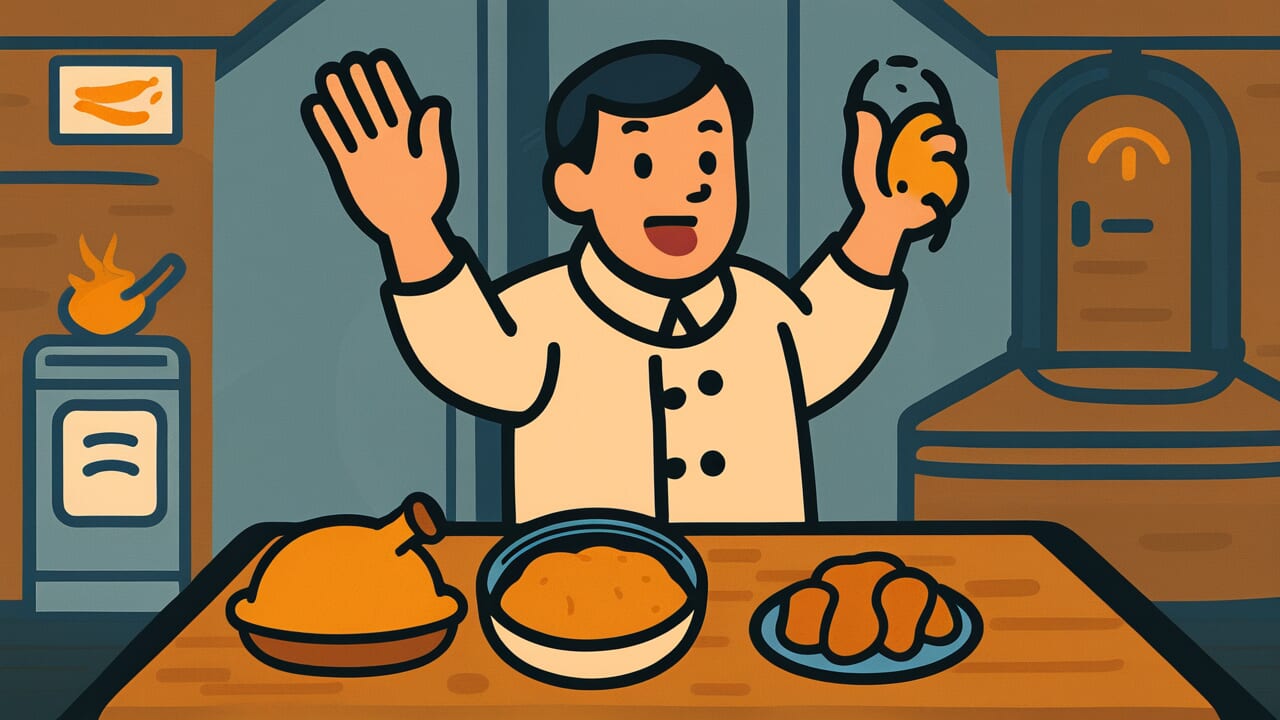How to Read “When the feast ends, don’t let your guard down”
Chisō owaraba yudan suna
Meaning of “When the feast ends, don’t let your guard down”
This proverb teaches that you shouldn’t relax after something good ends. When a fun dinner party finishes and you feel relieved, or when a big project wraps up and you breathe easy, people naturally lose focus.
But that moment is actually the most dangerous time.
You use this saying right after completing a project or when an event successfully ends. It applies when you’re filled with a sense of achievement. You want to bask in the afterglow of success, but there’s still work to do.
Cleanup, writing reports, preparing for what’s next—these tasks remain. If you neglect this final push, all your previous effort can go to waste.
Even today, accidents happen on the way home right after exams end. Contract errors occur after big deals close. Failures from letting your guard down never stop.
This proverb reminds us how important it is to stay focused until the very end.
Origin and Etymology
Unfortunately, no definitive written records exist for the exact origin of this proverb. However, we can make interesting observations from how the words are structured.
The word “chisō” means luxurious food today. But originally it meant “running around to take care of someone.” It referred to rushing about to serve guests.
This word came to mean the food itself because meals were central to hospitality.
Traditional Japanese hosting culture likely gave birth to this proverb. Welcoming guests involved a complete flow: preparation, serving food, and seeing them off. When the food was served and things settled down, both host and guests tended to relax.
But it wasn’t truly over until guests left or cleanup finished.
This proverb probably emerged to warn against mistakes and accidents that happen easily during this time. The end of a banquet requires attention to many things like putting out fires and locking doors.
Usage Examples
- Just because the project presentation succeeded doesn’t mean we can relax—when the feast ends, don’t let your guard down. We can’t lose focus until we submit the report.
- I got injured celebrating after winning the match. It was exactly like when the feast ends, don’t let your guard down.
Universal Wisdom
Humans have a tendency to snap the thread of tension the moment they achieve a goal. This is partly physiological—an instinctive desire to be released from a prolonged state of concentration.
This proverb sees through this human nature and warns us not to let our guard down until the very end.
What’s interesting is that this proverb focuses on “when it ends” rather than “after it ends.” Our ancestors knew that carelessness begins the moment the end comes into view, not after everything is completely finished.
When people see the goal, they unconsciously assume victory. They act as if they’ve already arrived, even though they haven’t yet.
It’s also important that this proverb assumes something “good” as the premise. A fun banquet, a successful project, a victorious match. When positive emotions run high, people’s judgment becomes dull.
The emotion of joy paralyzes our sense of caution. Our ancestors learned through experience that humans are creatures weak to happiness.
This wisdom shows a deep understanding of human nature that never fades, no matter how times change.
When AI Hears This
In the world of predators, right after eating is the most dangerous time. When a snake swallows large prey, it uses enormous energy for digestion and becomes extremely slow.
In this state, it can neither escape nor fight back. It gets attacked by enemies it could normally avoid easily.
Lions are similar. When they’re full, their vigilance drops. Packs of hyenas can steal their prey.
What’s interesting is that this vulnerability is a physiologically unavoidable phenomenon. Digesting food requires concentrating blood flow to the stomach and intestines. This means blood flow to muscles and brain decreases.
Physical ability and judgment drop simultaneously. Humans get sleepy after eating for this reason. It’s not a matter of willpower but a structural constraint of being a living organism.
Even more noteworthy is that many animals know this weakness. They deliberately adopt strategies to target opponents right after they eat. Cheetahs repeatedly scan their surroundings after catching prey, before they start eating.
They instinctively understand they’ll be defenseless while eating.
This proverb captures a biological truth: the moment of success is the greatest crisis. Right after achieving a goal, our brain’s reward system activates and vigilance automatically loosens.
This is a structural blind spot common to all life, created by hundreds of millions of years of evolution.
Lessons for Today
In modern society, we face “almost done” moments everywhere. The end of long meetings, work right before deadlines, driving just before arriving home.
This proverb teaches that these “almost there” moments are the most dangerous.
Modern people especially are always chased by the next task. When one thing is almost finished, our minds already start thinking about the next thing.
This multitasking mindset steals our attention from the work right in front of us. That’s why it’s important to consciously tell yourself “it’s not finished yet.”
As practical advice, prepare a checklist for the end of tasks. Build a habit of checking one more time the moment you think you’re done.
Also, after a big achievement, don’t immediately move to the next action. Take a breath and calm down. This is important too.
So your effort doesn’t get ruined at the very last moment. Don’t let your guard down until you cross the finish line—no, even after crossing it.
Keep moving forward with focus. That’s what protects you.



Comments